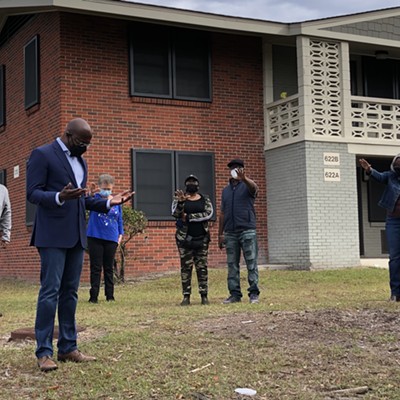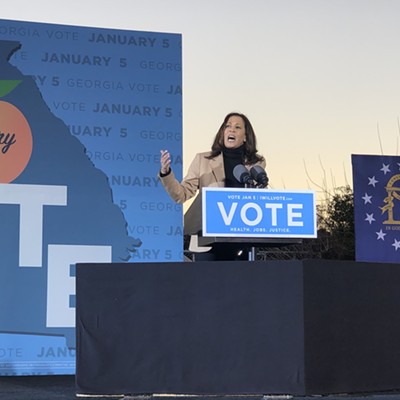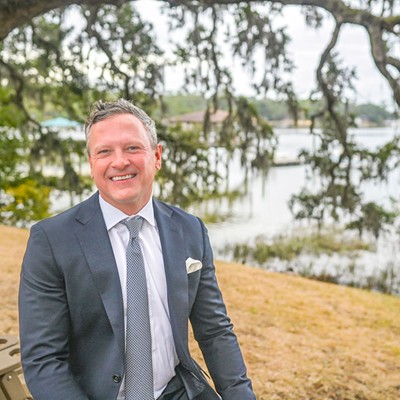With state revenues plummeting and a stormy forecast predicted for the next several budget years, the newly formed Tax Reform Council convened for the first time at the end of July to begin the unenviable task of analyzing the state's tax code.
The eleven member committee consisting of economists and business leaders will create recommendations for ways to stabilize revenue, make the state more business friendly and hopefully not screw over lower and middle class families in the process.
The icing on the cake is that they only have five months to complete their assignment before presenting their findings to a joint committee in the state's General Assembly, which reconvenes in January.
"You probably know, if you cover politicians, we never seem to do anything in the political arena until we're absolutely out of time to do it," says Larry O'Neal, a former accountant and the Representative from District 146 who led the charge for legislation creating the Tax Reform Council earlier this year.
"I absolutely admit that this is incredibly ambitious to do what we're asking them to do, but it's ambitious out of pure need," says O'Neal. "When you go from $21 billion in the budget three years ago, that's down $4 billion this year over three years ago, that's unprecedented since the great depression."
Budget woes aren't the only issue on the table either. The committee's first meeting came on the heels of a study announcing that Georgia has the sixth weakest economy in the country, having lost more than 74,000 jobs in the last 18 months, according to analysis of state employment trends by Portfolio.com and Bizjournals.
While job creation is a crucial component of the discussions, the solution will not be as simple as cutting corporate taxes. Georgia already has the eighth lowest corporate income tax among the 50 states, according to materials presented to the council by Georgia State University economist Carolyn Bourdeaux.
The tax rate is only the beginning of how the tax code affects business and investment in the state. There are also costs of compliance and decades' worth of special interest tax exemptions that remain on the books with little or no evidence validating their worth.
"Hopefully, we're going to eliminate or recommend repealing some of what's in place, including layers and layers of old stuff," says Brad Dickson, the only certified accountant on the council.
Given the timeframe, which likely prohibits a dramatic move like creating a new system altogether, the goal of increasing efficiency would seem to be the most likely outcome.
"If we have a year and a half, the governor was in place, and we were starting fresh, a committee like that would do something different. It would have more time to think about restructuring and not just making changes," says David Sjoquist, Director of the Fiscal Research Center at Georgia State University and a member of the tax council.
The small window of opportunity for the council to conduct its work is a necessity for two reasons; first, because of the urgency of the state's budget problems, and second, the desire to keep the process as distant from politics as possible.
Although numerous committees of elected officials have scrutinized the state's tax code, this is a first time expert private citizens have been charged with such a task in the state of Georgia.
"I know everybody thinks this is politics as usual, but from my perspective it's not," says O'Neal. "All this is gonna happen after an election, and this has been designed just that way, to take the politics aspect out of it."
Once legislation to enact the council's recommendations lands on the floor of the General Assembly floor for an up or down vote, the situation will undoubtedly become political, and the question of who will be in power following November's election adds another level of uncertainty to the council's proceedings.
"We all know elections are happening and some of these people might change. It is what it is," says Dickson. "I can't worry about that now and I won't worry about it. Maybe in the fall I will."
With a matter this important, and the necessity of involving the state legislature, it will be impossible to completely remove politics from the equation, what matters, according to O'Neal, is that the council be able to deliberate on matters apolitically, and use what time they have for the best possible outcome.
"Politics and what is feasible is going to drive some of this, and that's partly due to the timeframe, not the fact that the new governor isn't going to be in place until after the recommendations are sent forward," says Sjoquist. "Politics could play a role, but it remains to be seen."
The next meeting of the full council is scheduled for August 25. There are plans to hold public meetings around the state as well to gather additional input, however, no definite schedule has been set yet.




























